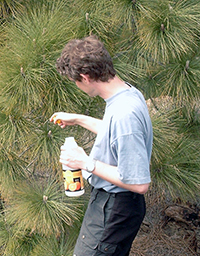 Christopher Traiser. State Museum of Natural History, Rosenstein 1, 70191 Stuttgart, Germany. traiser@smns-bw.de
Christopher Traiser. State Museum of Natural History, Rosenstein 1, 70191 Stuttgart, Germany. traiser@smns-bw.de
Christopher Traiser studied biology, geology and meteorology and received his PhD in palaeontology at the University of Tübingen. He has his main research interests in the evolution of plant leaves in space and time and its relationship to palaeoenvironmental conditions.

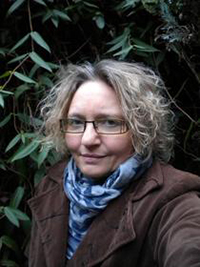 Anita Roth-Nebelsick. State Museum of Natural History, Rosenstein 1, 70191 Stuttgart, Germany. anita.rothnebelsick@smns-bw.de
Anita Roth-Nebelsick. State Museum of Natural History, Rosenstein 1, 70191 Stuttgart, Germany. anita.rothnebelsick@smns-bw.de
Anita Roth-Nebelsick is curator for fossil plants at the State Museum of Natural History in Stuttgart. Her research interests focus on plant functional morphology and palaeoecology.

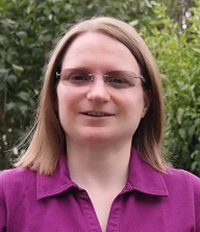 Michaela Grein. State Museum of Natural History, Rosenstein 1, 70191 Stuttgart, Germany. michaela.grein@smns-bw.de; present address: Übersee-Museum Bremen, Bahnhofsplatz 13, 28195 Bremen, Germany. m.grein@uebersee-museum.de
Michaela Grein. State Museum of Natural History, Rosenstein 1, 70191 Stuttgart, Germany. michaela.grein@smns-bw.de; present address: Übersee-Museum Bremen, Bahnhofsplatz 13, 28195 Bremen, Germany. m.grein@uebersee-museum.de
Michaela Grein received her PhD in paleontology from the University of Tübingen, Germany. She is a research associate in paleobotany at the State Museum of Natural History in Stuttgart. Her research is focused on paleoclimate and paleoCO2-modeling, and the paleoecological analysis of Cenozoic leaf floras.

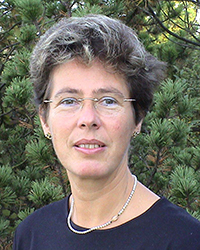 Johanna Kovar-Eder. State Museum of Natural History, Rosenstein 1, 70191 Stuttgart, Germany. johanna.eder@smns-bw.de
Johanna Kovar-Eder. State Museum of Natural History, Rosenstein 1, 70191 Stuttgart, Germany. johanna.eder@smns-bw.de
Johanna Kovar-Eder´s research is focused on leaf assemblages and the evolution of flora and vegetation in the Paleogene and Neogene.

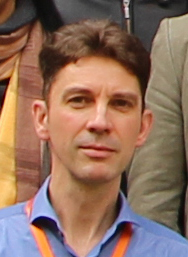 Lutz Kunzmann, Senckenberg Natural History Collections Dresden, Königsbrücker Landstr. 159, 01109 Dresden, Germany. lutz.kunzmann@senckenberg.de
Lutz Kunzmann, Senckenberg Natural History Collections Dresden, Königsbrücker Landstr. 159, 01109 Dresden, Germany. lutz.kunzmann@senckenberg.de
Lutz Kunzmann got a PhD in paleontology/paleobotany at the Humboldt University Berlin. He is curator of paleobotany at the Senckenberg Natural History Collections Dresden and lecturer at the Technical University Bergakademie Freiberg (Sachsen). His research focus is on the evolution of Paleogene and Neogene vegetation in central Europe, in particular on sociological, ecological and climatic aspects.

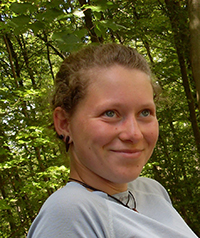 Karolin Moraweck. Senckenberg Natural History Collections Dresden, Königsbrücker Landstr. 159, 01109 Dresden, Germany. karolin.moraweck@senckenberg.de
Karolin Moraweck. Senckenberg Natural History Collections Dresden, Königsbrücker Landstr. 159, 01109 Dresden, Germany. karolin.moraweck@senckenberg.de
Karolin Moraweck got a diploma in Geography/Geology/Biology at the Technical University of Dresden and is currently finishing her phD in paleobotany at the Technical University of Dresden and the Senckenberg Natural History Collections Dresden. Her research focuses on the vegetational response correlated to paleoclimate and paleoatmospheric changes during the Paleogene/Neogene in central Europe.

 Jörg Lange. State Museum of Natural History, Rosenstein 1, 70191 Stuttgart, Germany. joerg.lange@smns-bw.de
Jörg Lange. State Museum of Natural History, Rosenstein 1, 70191 Stuttgart, Germany. joerg.lange@smns-bw.de
Jörg Lange works on projects of Bioinformatics and Biodiversity at the Museum for Natural History in Stuttgart.
Jörg Lange received a Ph.D. in Biophysics at the Georg-August-University of Göttingen, Germany. During stays at the Max-Planck-Institute for Biophysical Chemistry, the University of Southern California and the Max-Planck-Institute for Molecular Genetics he developed towards a Life Science programmer. He pursued a long term career as Computational Biologist at the company Novartis, Basel, Switzerland.

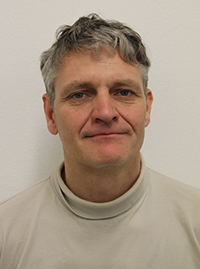 Jiří Kvaček. National Museum Prague, Václavské náměsti 68, 115 79 Prague 1, Czech Republic. jiri.kvacek@nm.cz
Jiří Kvaček. National Museum Prague, Václavské náměsti 68, 115 79 Prague 1, Czech Republic. jiri.kvacek@nm.cz
Jiří Kvaček works 30 years on Cenophytic plant mega- and meso-fossils from Europe.

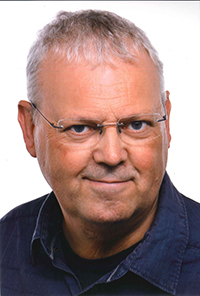 Christoph Neinhuis. Technische Universität Dresden, Institute for Botany, Zellescher Weg 20b, 01217 Dresden, Germany. christoph.neinhuis@tu-dresden.de
Christoph Neinhuis. Technische Universität Dresden, Institute for Botany, Zellescher Weg 20b, 01217 Dresden, Germany. christoph.neinhuis@tu-dresden.de
Christoph Neinhuis holds the chair for botany at TU Dresden. He is also director of the Botanical Garden, and appointed Speaker of the Department of Biology. Research interests cover plant biodiversity, especially systematics and phylogeny of Aristolochiaceae and Piperaceae as well as biomechanics and functional morphology. Long lasting research interest counted for non-wettable and self-cleaning biomimetic surfaces and fiber-based plant structures and their potential for composites in engineering.

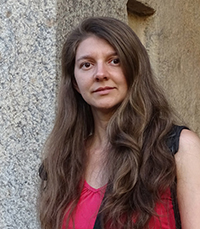 Annelise Folie. Royal Belgian Institute of Natural Sciences, rue Vautier 29, 1000 Brussels, Belgium. afolie@naturalsciences.be
Annelise Folie. Royal Belgian Institute of Natural Sciences, rue Vautier 29, 1000 Brussels, Belgium. afolie@naturalsciences.be
Annelise Folie did her undergraduate studies at the University of Namur and got her M.Sc. in Geology and Ph.D. in Paleontology at the University of Brussels in 2006. Since 2007, she is responsible for the Paleontogy Collections at the Royal Belgian Institute of Natural Sciences, Brussels, where she became curator in 2012. Her main research interest is on Paleogene herpetofaunas and ecosystems.

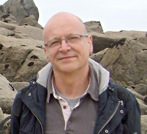 Dario De Franceschi. CR2P-Sorbonne-Universités, CP38, 57 rue Cuvier, 75231 Paris, France. dario.de-franceschi@mnhn.fr
Dario De Franceschi. CR2P-Sorbonne-Universités, CP38, 57 rue Cuvier, 75231 Paris, France. dario.de-franceschi@mnhn.fr
Dario De Franceschi works on Cenozoic macrofossils and paleoenvironment.

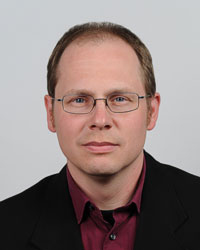 Andreas Kroh. Naturhistorisches Museum Wien, Burgring 7, 1010 Vienna, Austria. andreas.kroh@nhm-wien.ac.at
Andreas Kroh. Naturhistorisches Museum Wien, Burgring 7, 1010 Vienna, Austria. andreas.kroh@nhm-wien.ac.at
Andreas Kroh is a researcher and curator at the Natural History Museum in Vienna, Austria. His main research interests are echinoderms, with focus on the phylogeny, nomenclature and systematics of echinoids. Being a paleontologist with a strong interest in bridging the gap between life and earth sciences, he is actively involved in various efforts to ease access to biodiversity and taxonomic data on echinoids. He is involved in two database projects working towards this goal: the World Echinoidea Database (marinespecies.org/echinoidea) and the Echinoid Directory (www.nhm.ac.uk/research-curation/research/projects/echinoid-directory).

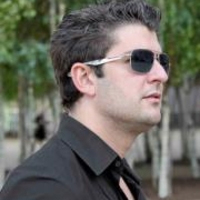 Cyrille Prestianni. Royal Belgian Institute of Natural Sciences, rue Vautier 29, 1000 Brussels, Belgium. cprestianni@naturalsciences.be
Cyrille Prestianni. Royal Belgian Institute of Natural Sciences, rue Vautier 29, 1000 Brussels, Belgium. cprestianni@naturalsciences.be
Cyrille Prestianni works at the Royal Belgian Institute of Natural Sciences, Brussels. His research is focused on Paleozoic floras and faunas.

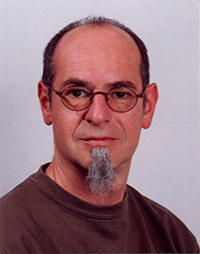 Markus Poschmann. Generaldirektion Kulturelles Erbe RLP, Direktion Landesarchäologie / Erdgeschichte, Niederberger Höhe 1, 56077 Koblenz, Germany. markus.poschmann@gdke.rlp.de
Markus Poschmann. Generaldirektion Kulturelles Erbe RLP, Direktion Landesarchäologie / Erdgeschichte, Niederberger Höhe 1, 56077 Koblenz, Germany. markus.poschmann@gdke.rlp.de
Markus Poschmann is conducting palaeontological excavations in Rhineland-Palatinate and is an expert on fossil chelicerate arthropods.

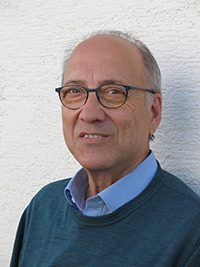 Michael Wuttke. Senckenberg Research Institute, Senckenberganlage 25, 60325 Frankfurt am Main, Germany. michael.wuttke@senckenberg.de
Michael Wuttke. Senckenberg Research Institute, Senckenberganlage 25, 60325 Frankfurt am Main, Germany. michael.wuttke@senckenberg.de
Michael Wuttke got a PhD in vertebrate palaeontology at the Johannes Gutenberg University Mainz. He is volunteer in the Department of Messel Research and Mammology at the Senckenberg Research Institute Frankfurt/M. His research focus is on the evolution and biology of Paleogene frogs in central Europe, and in palaeolimnological research of volcanogenic lakes.

